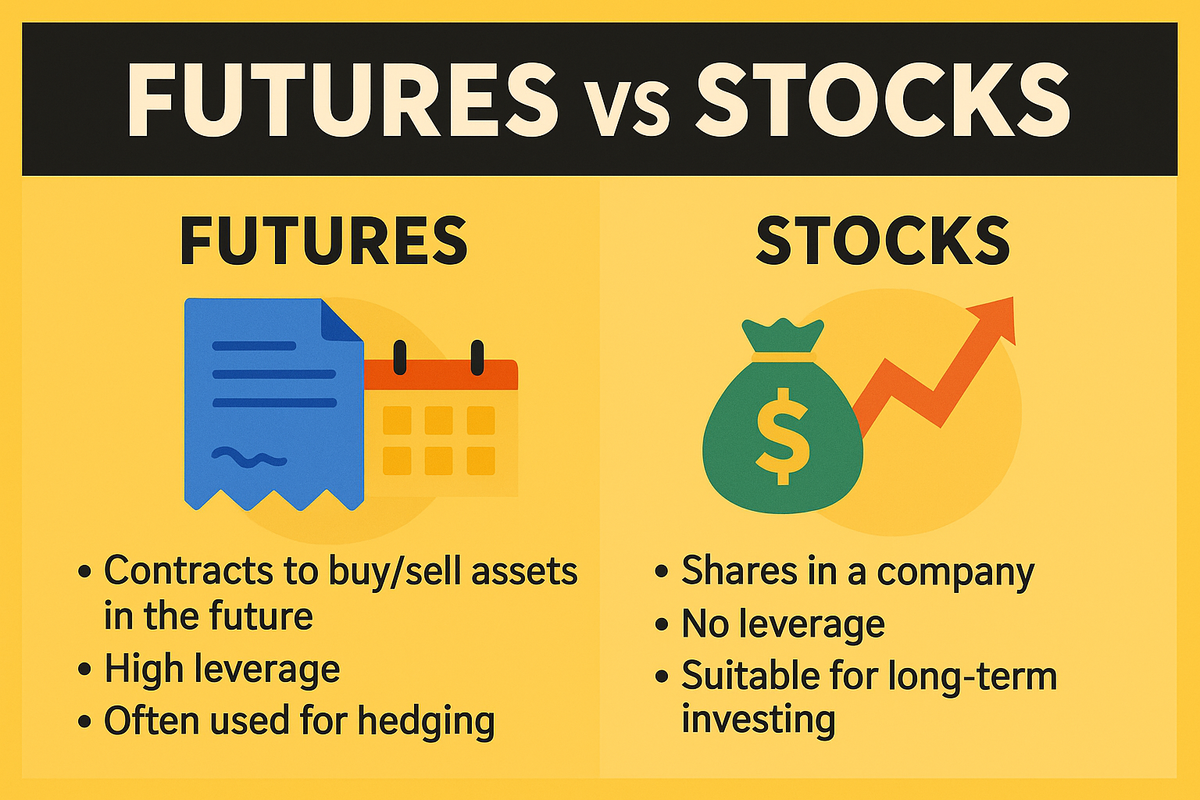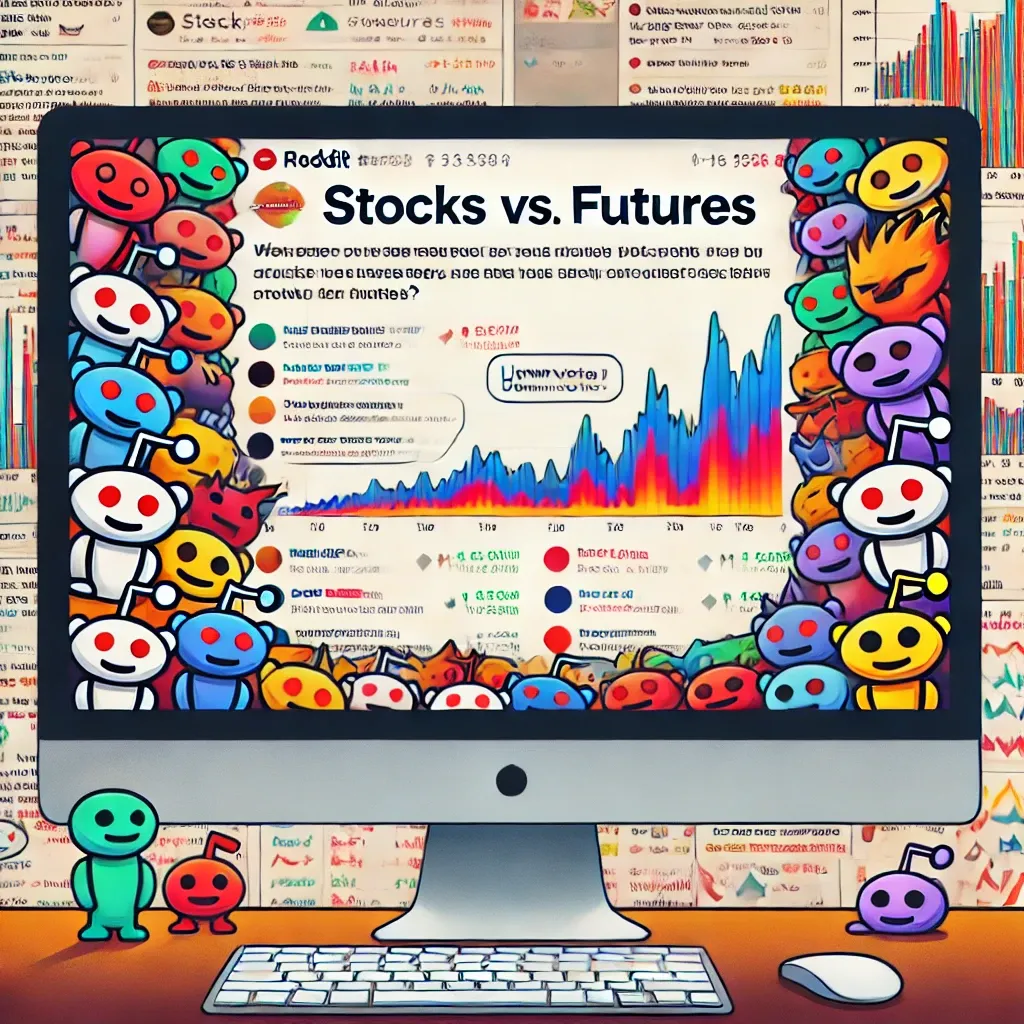Trading Futures vs Stocks: What is More Profitable?

What is the Difference Between Futures and Stocks?
Before comparing profitability when it comes to trading futures vs stocks, it’s essential to understand how these instruments operate. The key distinctions between owning stocks and trading futures—or even the choice between futures vs options—shape your trading experience and risk exposure.
Ownership vs Contracts
When trading stocks, you are purchasing actual ownership in a company. Each share grants a fractional claim on the company’s assets and potential dividends, and you benefit directly if the company grows in value. Futures contracts, on the other hand, are agreements to buy or sell an asset at a future date for a set price—these can be commodities, stock indices, or currencies.
You never truly “own” anything tangible with futures; instead, you are speculating on price movements. This contract-based trading enables greater flexibility—but also adds complexity. Do you prefer tangible equity, or are you more interested in price speculation and hedging?
Expiration Dates and Settlement
A striking difference between futures and stocks is expiration. Stocks can be held indefinitely, giving investors control over their timeline. Nearly all futures contracts have predefined expiration dates, with settlement occurring at contract end. This means you must either close the position, roll it over into a new contract, or take/make delivery (rare for private traders).
Because of this, timing and planning are more critical in futures trading. Have you considered how contract lifespans align with your personal investment horizon?
Market Purpose and Use Cases
Stocks are commonly used for building long-term wealth, retirement accounts, and dividend income. Futures, originally designed for hedging commodity risk, are now used widely for speculation, hedging, and risk management. They’re favored for short-term trading and for gaining exposure to markets—including commodities and indexes—you couldn’t otherwise access directly.
So, which fits your needs: long-term growth through ownership, or fast-moving contracts tailored to speculation and hedging?

How Does Leverage Affect Profit in Futures vs Stocks?
Leverage is a double-edged sword in financial markets and represents one of the signature differences between trading stocks vs futures. Understanding how leverage impacts your profit and loss—sometimes dramatically—is fundamental to comparing these two instruments.
Margin Requirements Compared
Trading stocks usually involves paying the full price per share, though margin accounts might offer 2:1 or sometimes 4:1 leverage for day trading. In contrast, futures require only a fraction (margin) of the contract’s value as collateral, frequently enabling leveraging 10:1 or even higher.
This means with the same amount of capital, you can control much larger futures positions than in stocks. But is the increased risk manageable for your account balance—especially in fast-moving markets?
Real-World Leverage Scenarios
Suppose you have $5,000. With stock margin, you might control up to $10,000-$20,000 of shares. With futures, you could enter a contract controlling $50,000 or more of an asset depending on margin rules and volatility. While this multiplies profit potential, losses are likewise magnified.
Many beginning traders underestimate the speed at which leveraged futures can move, leading to rapid drawdowns. Have you calculated your “worst-case scenario” and planned accordingly?
The Risk-Reward Tradeoff
Leverage increases potential returns—making futures day trading appealing—and potential losses. This tradeoff means risk management and stop-loss orders are crucial. Stocks tend to be less volatile thanks to less leverage, but the profits (and losses) may also be smaller in relative terms.
Deciding between futures and stocks means balancing appetite for risk with desired returns. Does your strategy favor steady growth, or are you comfortable with higher risk for the shot at faster profits?
Trading Futures vs Stocks: What Is More Profitable?
Profitability is the core of the futures vs stocks debate. Both promise profit, but the paths differ—especially when day trading futures or trading stocks vs futures on Reddit.
Short-Term Profit Potential
Futures excel at short-term trades due to leverage and high liquidity. Traders can capture small price movements and generate significant returns in a short span. Quick flips and day trading are common, and more volatile markets generate outsized profit opportunities.
Stocks can also profit quickly, particularly from news events, but are generally held for slower appreciation. Which fits your style—fast-moving action or a slower buildup?
Long-Term Wealth Growth
Stocks usually win for long-term portfolio growth. They can appreciate over years, pay dividends, and offer a path to compounding returns that few other assets can match. Historically, equity markets have been the backbone of retirement savings and wealth transfer.
Futures are rarely used for long-term “buy and hold” strategies due to contract expirations and the risk of leverage. However, futures options can sometimes mimic this approach for sophisticated investors.
Capital Efficiency
One major advantage of futures is capital efficiency. Because of minimal margin requirements, you can deploy less money to control large positions, freeing up capital for other trades or investments. This boosts your return on equity if trades go well—but don’t forget, leverage can also backfire.
Wondering which to choose? High volumes and aggressive traders often favor futures, while long-term investors stick with stocks for capital safety and compounding.

Best Time to Trade Futures vs Stocks
Market trading hours are a practical but essential consideration when building your strategy. Whether you are a night owl or prefer daytime trading, knowing the best time to trade futures and how futures exchange hours differ from stock exchange sessions can improve your performance.
Futures Exchange Hours and Market Access
Futures offer nearly 24-hour market access, operating Sunday evening through Friday afternoon with brief daily maintenance breaks. This lets traders capitalize on global events and volatility at any hour, and is why many institutional traders favor futures for flexibility.
For example, the CME Group exchange for financial futures operates from 6:00 p.m. to 5:00 p.m. Eastern Time, nearly round-the-clock. When do futures markets open relative to your timezone? Consult CME Group’s official schedule.
Stock Market Trading Hours
In contrast, stocks generally trade during regular exchange hours—9:30 a.m. to 4:00 p.m. Eastern Time in the US—with limited pre-market and after-hours activity. Liquidity and price transparency are best during regular hours, and off-hour moves can be erratic due to thin volume.
If you want more flexibility, futures might have the edge. But stock traders often appreciate set opening and closing bells for planning and discipline.
Best Time to Trade Futures for Volume and Volatility
The highest trading volume and volatility for futures often occurs when markets overlap—such as during the US stock market open or major international economic releases. Seasoned traders focus on these periods to maximize profit potential and minimize slippage.
Are you trading at the most active times for your chosen market? Funded Futures Network’s preferred platforms can help identify session overlaps for effective trading.
Day Trading Futures vs Day Trading Stocks
If you’re looking for fast trades and rapid results, day trading futures vs stocks offers important differences. Evaluating speed, cost, and the platforms you’ll use can clarify the right fit for your approach.
Speed and Scalability
Futures markets are built for speed: trades execute within milliseconds, and deep liquidity pools mean large orders are filled quickly. This is vital for scalpers and active day traders aiming for multiple trades a day.
Stocks are scalable, too, but thinly traded equities may show wider spreads and slippage. Do you need ultra-fast fills, or is occasional lag acceptable to you?
Commissions and Trading Costs
While commissions have dropped for stocks, futures trading costs can be even lower—especially for high-frequency traders. Many futures brokers offer competitive per-contract pricing, and tight bid-ask spreads reduce transaction costs.
Compare this with potential fees for stock trades, or futures options trading, to see which suits your activity level and account size. How do the platforms you’re considering stack up in terms of value?
Platforms and Broker Support
Not all brokers offer the same tools for stocks, futures, or futures options trading. Some specialize in low-latency futures execution with advanced charting, while others focus on long-term stock investing tools. Reliable brokers like those at Funded Futures Network or third-party platforms such as EdgeproX can provide both, but double-check before committing.
Look for demo accounts, customer support, educational resources, and the availability of futures vs stocks for seamless trading.
Futures Options vs Stock Options
Understanding the differences between futures options and stock options is key when comparing trading futures vs stocks. Both instruments add strategic possibilities and leverage, but they function differently regarding contract size, pricing, expiration cycles, and how traders use their flexibility for profits. Grasping these distinctions will help you decide which instrument suits your risk tolerance and trading plans.
Contract Size and Pricing
Futures options usually control larger notional values compared to stock options. For example, one E-mini S&P 500 futures option might represent exposure to $50 times the S&P 500 Index, whereas a standard stock option contract covers 100 shares. This results in futures options being more capital efficient for those trading large index moves or commodities, though it also raises risk per contract.
The cost structure is also different. Futures options often have lower commissions per unit of underlying value, while stock options might be more accessible for retail traders due to smaller absolute contract size. This makes futures options attractive for active traders seeking efficiency, while beginners might find stock options easier to scale into small positions. Which would you prefer: high notional exposure or granular position sizing?
Expiration Cycles
Stock options generally have monthly or weekly expiration cycles, giving traders a broad selection of dates for opening and closing positions. Futures options expiration dates tend to align closely with the underlying futures contracts, sometimes offering fewer intermediate terms, depending on the product and exchange.
This difference affects strategy selection—futures options traders must stay more aware of rollover risks and timing, while stock options traders can fine-tune their expiration selection. Does your approach require pinpoint expiration management, or do you prefer regular, predictable cycles?
Volatility and Strategy Flexibility
Futures options often trade on highly volatile markets such as commodities and indexes, meaning premium and risk assessments can change quickly. This volatility provides opportunities for selling premium or hedging, making them popular among advanced traders who use strategies like straddles, strangles, and vertical spreads.
Stock options, while also versatile, might offer less dramatic swings, especially on stable blue-chip equities. Traders often focus on covered calls, cash-secured puts, and protective collars. Which market’s volatility and flexibility fits your risk comfort and strategic mindset?
Futures Trading Strategies vs Stock Trading Strategies
Successful trading relies on strategies suited to each market’s unique characteristics. Whether you’re pursuing day trading futures or looking for longer-term stock growth, understanding the core approaches will help you make informed decisions.
Popular Futures Trading Strategies
Futures traders frequently use momentum strategies, scalping, and spread trading. Momentum strategies exploit rapid price moves during high volume and volatility (often surrounding economic data releases). Scalping focuses on small, quick profits repeated many times a session—taking advantage of tight spreads and constant market movement. Spread trades involve holding both long and short positions in related contracts to capture price difference (like calendar or inter-commodity spreads), which can reduce risk compared to outright directional trades.
Other futures trading strategies include mean reversion, breakout trading, and following global news for macro-driven trades. Have you tried different futures strategies to see which best matches your market outlook and discipline?
Common Stock Strategies
Stock traders often gravitate towards swing trading, trend following, or buy-and-hold strategies. Swing trading capitalizes on multi-day price fluctuations, while trend following identifies and rides larger price trends—sometimes using 50- or 200-day moving averages. Buy-and-hold, frequently used by investors, aims for long-term compound returns through appreciation and sometimes dividends.
Dividend capture, value investing, and sector rotation are also popular, especially among investors prioritizing wealth accumulation and portfolio diversification. Does your risk appetite and time commitment fit these more patient, research-focused stock approaches?
Strategy Selection Based on Volatility
The level of market volatility should influence your strategy. High volatility often favors scalping and momentum futures day trading, while stable markets offer more reliable returns with mean reversion or trend-following strategies. For stocks, volatile earnings seasons or market corrections might warrant hedging with options or shifting to defensive sectors.
How Are Futures Taxed vs Stocks?
Tax treatment has a big impact on profitability and should not be overlooked when deciding between futures vs stocks. The US tax code offers some unique benefits—and pitfalls—depending on which assets you’re trading.
Section 1256 Tax Treatment
Futures contracts and certain other 1256 contracts receive mixed tax treatment in the US: 60% of gains are taxed as long-term capital gains, and 40% as short-term, regardless of how long the trade was held. This blended rate can lower a trader’s overall tax liability compared to short-term stock or options trades, which are taxed as ordinary income.
Additionally, mark-to-market rules apply at year-end, meaning all open futures positions are “closed” for tax purposes and gains/losses are realized. This simplifies reporting but demands close recordkeeping. Are you prepared for these annual mark-to-market requirements?
Capital Gains on Stocks
Stocks are taxed according to holding period. Long-term capital gains rates (for assets held over a year) are usually lower than ordinary income, while short-term capital gains (under 1 year) are taxed as regular income. Frequent stock traders may pay more in taxes on short holdings, especially if they’re in higher income brackets.
This can make a dramatic difference for day traders or those with rapid portfolio turnover.
Which Has the Tax Advantage?
For active traders, Section 1256’s favorable treatment and blended rate often give futures a tax advantage over stocks. However, buy-and-hold stock investors may benefit more if they consistently qualify for long-term capital gains rates. Your trading horizon and frequency will largely determine which is most tax-efficient for you.
For more guidance, consult a professional or reputable external sources like IRS.gov, as well as your broker’s education section.

What Reddit Traders Are Saying: Trading Stocks vs Futures Reddit
Online trading communities, especially on Reddit, offer uncensored opinions and experiences with trading stocks vs futures. Many users argue that futures are better for active traders seeking leverage, short-term profits, and nearly 24-hour access. They praise futures for capital efficiency and volatility that can boost profits with the right futures trading strategies. However, others warn about the dangers of high leverage, steep learning curves, and potential for rapid losses—especially without proper risk management.
Comparisons of futures vs options trading frequently appear, with members noting that options may be more flexible but require more knowledge of pricing models (like Greeks), while futures are straightforward but intense. Posts on platforms like r/Daytrading and r/WallStreetBets also point out differences in tax treatment, margin calls, and market psychology.
If you’re curious about specific platforms and brokers, Reddit threads are filled with reviews and advice on execution speed, costs, and education resources. Many recommend paper trading on supported platforms—like those listed at Funded Futures Network’s preferred platforms—before committing real funds. Do you use social channels to refine your strategies and stay up-to-date with other traders’ real-world experiences?
Final Thoughts: Which Market Fits You Best?
Choosing between trading futures vs stocks comes down to your unique goals, personality, capital, and tolerance for volatility. Futures suit active traders, those seeking leverage, and anyone wanting to profit from short-term moves around the clock. Stocks, on the other hand, remain the go-to choice for investors aiming for long-term growth and those more comfortable with lower volatility and less frequent trading.
Many successful traders and investors maintain exposure to both, using stocks for wealth accumulation and futures for capital-efficient speculation or hedging. Consider your risk profile, available time, and willingness to master new strategies before committing fully to either path. Resources like Funded Futures Network, and Khan Academy offer further reading and guidance.
Are you ready to deepen your research, practice your strategies, and refine your approach on your journey to profitability? With the right blend of knowledge, planning, and discipline, you’ll find the trading style—or investment strategy—that fits you best.



